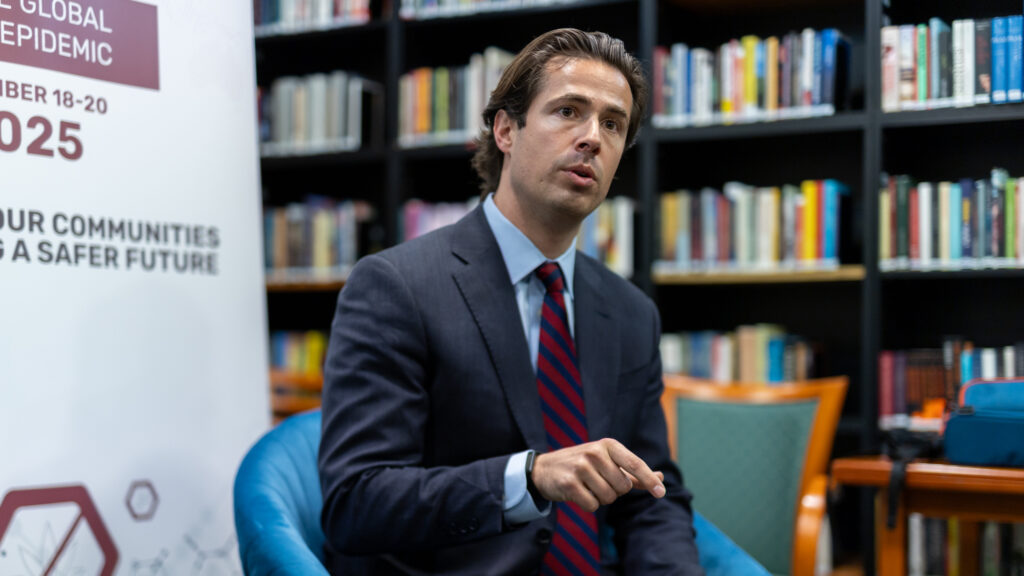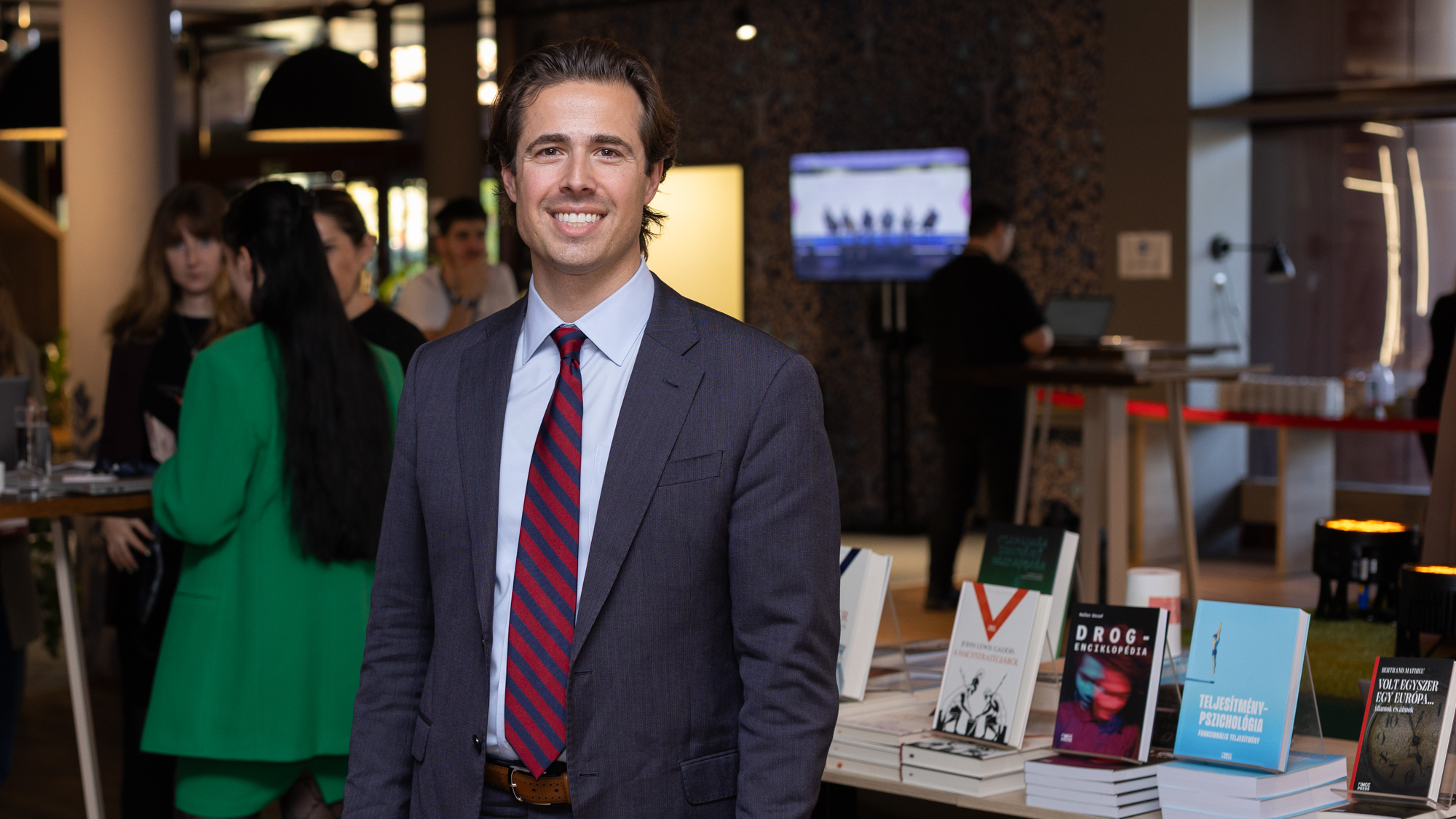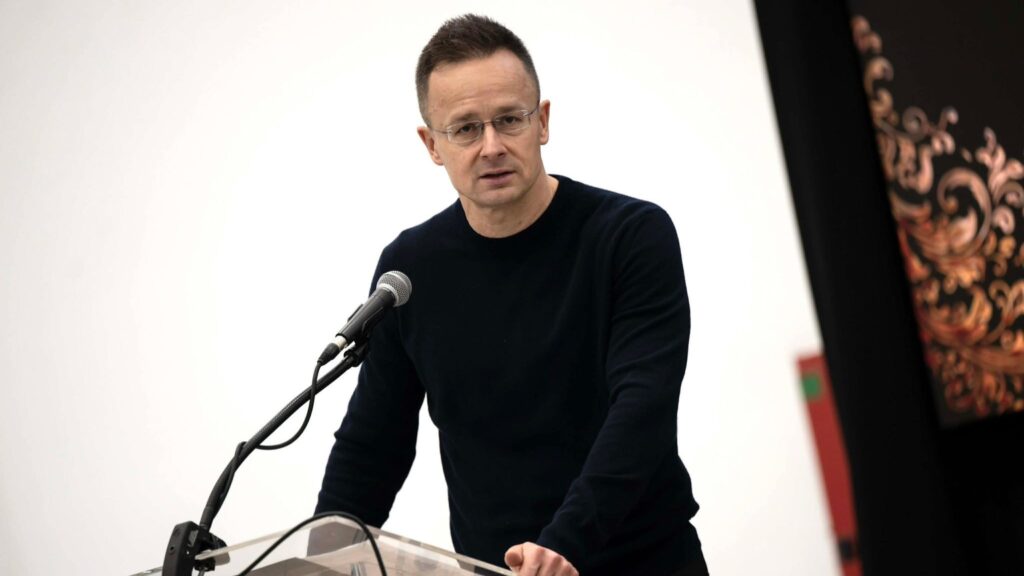Luke Niforatos is the Executive Vice President of Smart Approaches to Marijuana (SAM), a leading voice warning about the public-health and social consequences of drug liberalization. Speaking to Hungarian Conservative at the MCC Budapest Summit on the Global Drug Epidemic, he outlined why he believes the commercialization of high-potency cannabis has harmed families and communities in the United States. In the discussion, he stressed that powerful corporate interests are driving the push for wider legalization—from marijuana to psychedelics—and argued that nations committed to protecting families and social stability, including Hungary, should resist this trend.
So, Smart Approaches to Marijuana—what are the goals of your organization, and what do you mean by ‘smart approaches’?
Our goal as an organization is to educate the public about the harms of marijuana and the harms of legalization policies. We are known internationally as the leading voice against legalizing marijuana, commercializing it, and turning it into a corporatized, mass-market product. We have been the leading opposition to that. Our work is guided by a science advisory board made up of researchers from Harvard, Princeton, Yale—major experts on marijuana. We base everything we do on science and public health evidence about the drug, its harms, its addictive potential, and why it should not be legalized. In the US, we educate the public, we lobby, we advocate, we engage in elections. And now we work internationally too. We participate at the UN and the African Union, and we work with countries that invite us—such as Hungary—to educate policymakers on these issues.
In the US, several states have advanced far in legalizing marijuana and other psychedelics. What have been the negative effects of this liberalization process?
I’m from Colorado—the first state to legalize recreational marijuana, meaning it was open to everyone, not just medical. That is why I work on this issue: I saw how damaging it was for my state. I saw increases in crime, increases in violence, and increases in property crime in neighbourhoods around marijuana shops. I saw youth use going up. But what truly brought me into the issue was becoming a parent. I have two little girls now—nine and four. When my oldest was about ten months old, my wife and I were walking with her in a nice neighbourhood in Denver—a very safe area—and someone lit up a joint nearby. The smoke drifted into my daughter’s stroller while she was sleeping. My wife looked at me and said: ‘This is not normal. No family should have to raise their children in an environment with marijuana smoke everywhere.’ A few months later, I was working on this issue.
The biggest impact of legalization is how it destroys the family unit. In Colorado, more than half of marijuana users use it every single day. This is not occasional use—it is daily dependence. And today’s marijuana is far more potent. In the 1970s and 80s, THC levels were 2–3 per cent. Now they can reach 99 per cent. It’s effectively a different drug. There is vaping, shatter, wax, dabbing—extremely high-potency products.
With this potency comes addiction and serious mental health outcomes. I know families personally who have been devastated. My former neighbour, Laura Stack, lost her 19-year-old son after he became addicted to high-potency marijuana, developed psychosis, and jumped from a parking garage. Their family is destroyed. This is what is happening where marijuana is legal. It is not about individual liberty. Legalization leads to the destruction of families through addiction and its consequences.

So the marijuana industry has basically become a new ‘big pharma’?
Exactly. Big pharma has invested, but the biggest player is big tobacco. Tobacco companies worldwide have invested billions in marijuana. Cigarette use is declining, so they see marijuana as the next major revenue stream.
The comparison is important. Tobacco didn’t kill millions 500 or 1,000 years ago when people smoked pipe tobacco. It started killing people when the cigarette was invented about a century ago—when it became corporate, mass-produced, chemically altered, and aggressively marketed. The same process is happening with marijuana. It has been taken over by a giant industry. It is being altered, refined, genetically modified, and packaged in ways similar to the evolution from pipe tobacco to cigarettes. And now many more people are being harmed.
Following that logic, what comes after marijuana? Psychedelics, mushrooms, other drugs?
Yes. Marijuana is not only a gateway drug; it is a gateway policy. The same people who funded marijuana legalization and invested in the industry are now pushing psychedelics. They are trying to legalize at least six psychedelic substances—the most well-known being psilocybin, then ibogaine, MDMA, ecstasy, and others. Their stated goal is to legalize all drugs. And they are using the same strategy.
With marijuana, the first step was ‘medical marijuana’. For the first time in US history, we voted on medicine—something the FDA is supposed to decide. They funded ballot measures, referendums, and convinced people this was for patients. In reality, very few medical patients were involved. A handful of doctors wrote tens of thousands of marijuana recommendations. It was not medicine.
‘Hungary is right to keep a firm line’
Now they are repeating the same tactic with psychedelics: ‘medical psychedelics’, ‘psilocybin for PTSD’, etc. In Colorado, they don’t even require a medical card anymore. You simply self-certify: ‘I have an illness; I need psychedelics.’ And you can legally use them. It’s a complete façade—no evidence, no science, just politics and money. And the people bankrolling it have hundreds of millions invested.
That is why I think countries like Hungary—which is trying to be a global leader in drug policy, family policy, and social policy—are right to take a zero-tolerance approach. Once you let ‘medical marijuana’ in the door, you open the door to the entire industry: money, lobbying, political influence, campaign donations. In America, that is exactly what happened. Politicians who want to protect children are now fighting against an industry invested in targeting youth. That makes everything harder. Hungary is right to keep a firm line.
If I’m getting it right, it is far from a partisan issue in the US—marijuana industry has influence over both Republicans and Democrats?
Yes, it crosses party lines. Most conservative Republicans oppose legalization; most progressive Democrats support it. But there are exceptions. Some libertarian Republicans see it as a personal choice. Some progressive Democrats oppose it because they understand the scientific harms. So there is overlap on both sides.
Do you think there is any ‘conservative model’ of legalization—a version that could work?
No. I don’t think you can be conservative and support legalizing any drug. Conservatism is about preserving national heritage, identity, faith, family, community—core conservative ideals. Edmund Burke, the father of conservatism, would never have supported drug legalization. He believed the strength of society lies in its constitution, its social fabric, and its families.
Drugs devastate families. Addiction shifts your focus away from family, children, community—toward the drug. People steal from their own parents to fuel addiction. That is the opposite of conservative values.

Conservatism also rests on the belief that individuals must be capable of rational decision-making. Drugs impair rational choice and inflict long-lasting harm. Today’s marijuana can cause psychosis or schizophrenia. That is fundamentally incompatible with rational citizenship. And when you add faith—inseparable from conservatism—the argument becomes even clearer. Faith requires looking beyond oneself to our Creator. Scripture says the body is a temple; we cannot defile it with substances that harm and destroy. There is no conservative argument for legalizing drugs.
One last question: Western European countries like Germany, and even some in Eastern Europe like Czechia, are moving toward full legalization. What is your number-one advice to them?
Look at the statistics from countries and states that have legalized. Ask yourself: is this what you want for your nation? In every US state that legalized marijuana, youth addiction increased by 25 per cent. Do you want more young people addicted? Do you want more broken homes? Do you want more people dying on the roads from marijuana-impaired driving? In America, those numbers have risen by thousands. Do you want more workplace accidents because a coworker used marijuana yesterday and is still impaired today? Look at the evidence. If you evaluate it honestly—without money or politics involved—no one would choose these outcomes for their society.
Read more of our interviews:







